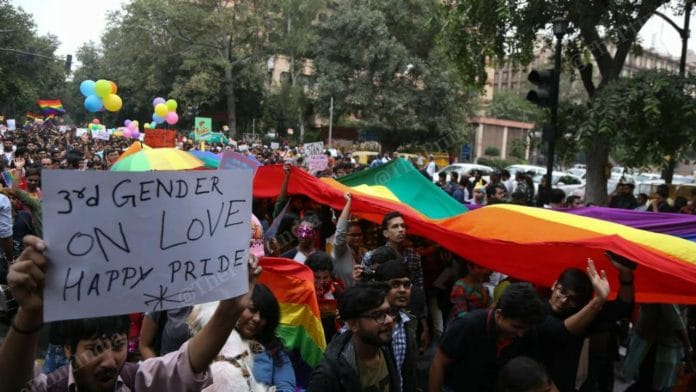New Delhi: A day after the Rajya Sabha passed the Transgender Persons (Protection of Rights) Bill, members of the trans community lashed out against the bill, saying they are anguished by “the murder of gender justice and complete disenfranchisement of trans people”.
Trans-rights activists Grace Bhanu, Vikram Aditya Sahai, Ray, Saransh Pathak, Anshum Banerjee and others, in a press conference Wednesday, appealed to President Ram Nath Kovind to not sign the bill into an act.
“We request the President to not sign the bill and send it back to the parliament. Take our inputs and draft a bill that truly empowers the community,” academic and trans-activist Sahai told ThePrint.
The trans community has been protesting against the bill for months now, saying it doesn’t empower them.
“It should be called the transgender ‘murder’ of rights bill, not the transgender protection of rights bill. It is a direct violation of the right to life with dignity,” said Ray, who goes by the mononym.
‘Fetishises trans body’
In 2014, the Supreme Court delivered a landmark judgment in the case of National Legal Services Authority versus the Union of India, also known as the NALSA verdict. The verdict recognised the rights of transgender persons to self-determine their identity without medical intervention or certification.
The bill in question, however, allegedly goes against this. It has a provision of certificate of identity for a transgender person, wherein an individual has to register an application with the district magistrate for a transgender identity certificate. And, in case an individual undergoes a sex reassignment surgery, they need to submit a medical certificate to the DM which reflects this change.
“If the DM isn’t satisfied and doesn’t think we are trans, then what? Do we stop being trans?” said Grace Bhanu, founder of Trans Rights Now Collective.
“This provision of the bill only serves to give greater control the medical industry, the judiciary and the police. They remain the all-supreme authority in the lives of trans-people,” said Sahai, adding that this would never be acceptable or conceivable for any other community.
“Would it ever be okay for the system to reduce a woman to her body, to prove her womanhood? We (trans people) are more than our bodies. The bill isn’t a trans-persons bill, but a trans-bodies bill. It fetishises the trans body,” Sahai added.
‘Attempt to destroy trans kinship’
The bill also provides for a jail term between six months and two years for any physical harm, including sexual abuse, against transgenders which is way less than the quantum of punishment reserved for sexual abuse against women, the activists point out.
“If a woman is sexually abused, there is a minimum punishment of seven years. But for trans people, it’s a maximum punishment of two years. The bill sees us as lesser beings,” Ray said.
The bill also advocates rehabilitation centres for trans people, which the activists say is an attempt to “destroy the kinship or ‘gharana’ structure prevalent within the community”.
“We are not animals who have been abandoned. We can choose our safe-spaces, we don’t need a rehabilitation centre,” said Saransh Pathak, trans activist and lawyer.
Also read: In Pictures: Delhi Queer Pride Parade takes on Transgender Bill 2019






